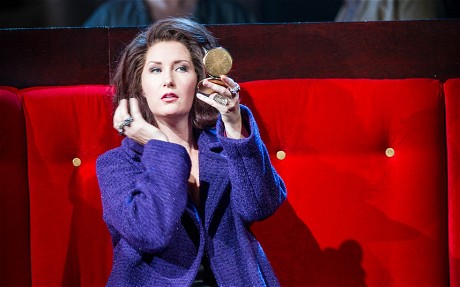 United Kingdom Janáček, The Makropulos Case (sung in English): Soloists, Chorus and Orchestra of Opera North/ Richard Farnes (conductor), Grand Theatre, Leeds, 18.10.2012 (JL)
United Kingdom Janáček, The Makropulos Case (sung in English): Soloists, Chorus and Orchestra of Opera North/ Richard Farnes (conductor), Grand Theatre, Leeds, 18.10.2012 (JL)
Cast
Emilia Marty: Ylva Kihlberg
Albert Gregor: Paul Nilon
Vítek: Mark Le Brocq
Kristina:Stephanie Corley
Jaroslav Prus: Robert Hayward
Janek: Adrian Dwyer
Dr Kolenatý: James Creswell
Technician: Matthew Hargreaves
Cleaning Woman: Sarah Pring
Hauk-Šendorf: Nigel Robson
Chambermaid: Rebecca Afonwy Jones
Creative Team
Conductor: Richard Farnes
Director: Tom Cairns
Set and Costume Designer: Hildegard Bechtler
Lighting Designer: Bruno Poet

Now considered one of the great twentieth century opera composers, Leoš Janáček took time to catch on. For example, The Makropulos Case, premiered in Brno 1926, took 40 years to reach the USA. One of the reasons may have been the off-beat nature of the opera plots. Also, the music must have sounded strange to some with its angular rhythms and harmonies – a style stranded somewhere between late romantic and the modernist tendencies of the period.
In Opera North Janáček has a found great champion, this being the sixth of his operas the company has mounted in recent years
The Makropulos Caseis an eccentric masterpiece in a genre difficult to define. A stab at it would be “tragi-comedy thriller” with some metaphysical contemplation thrown in. The complex plot revolves around the epicentric character of Emilia Marty, an irresistibly attractive opera singer who happens to be well over 300 years old.
Soprano Ylva Kihlberg, the Swedish opera singer who plays the opera singer seems to have packed more into her life in a tenth of the time, her career path so far taking in rock singer, economist and ballet dancer. The success of any production is heavily dependent on how the lead singer carries off what is one of the more demanding roles in opera. A frightening range of qualities is required to play the part – good diva looks, a soprano voice both large and flexible, and acting abilities that include being able to portray convincingly a serial seductress who can command those around her and roam the stage with slinking sensuality.
Ylva Kihlberg certainly looks the part and vocally fulfils the difficult demands with great competence. But in meeting the acting requirements mentioned above, she fell a little short at times and her physical movement was a little on the wooden side, making it difficult to imagine what she was like as a ballet dancer; and her delivery of the occasional witty one-liners did not always carry full comedic force. Nevertheless, in the last act, when Emilia is approaching death and some of the more sensual qualities are not required, she shifted up a gear and produced a performance of considerable power in music that is some of Janáček ‘s greatest.
Among supporting roles I particularly liked the way tenor Paul Nilon as Albert Gregor painfully conveyed the destructive power of unrequited love, showing how such obsession can unhinge the mind. Nigel Robson, a strong acting baritone, as the old roué Count Hauk-Sendorf, was popular with the audience in his brief light-relief role.
Set and costumes were suitably unpretentious, the curtain rising to reveal a lawyer’s office in mid twentieth century stacked with paper files. The lighting was patchy, mixing areas of bright and shade, presumably to create an atmosphere of shifting shadows and contrast. This backfired at times when characters who were singing and at the centre of attention were difficult to see if they had wandered into a shadowy area.
It is the orchestra, with its continuous commentary, that carries the main musical burden and it was heroically held aloft by Opera North’s Music Director, Richard Farnes, and his players. The standard was set at the start with Janáček ‘s magnificent overture that skilfully combines the contradictory elements of jagged, asymmetrical rhythms and phrases with soaring lyricism, and provides additional excitement with off-stage brass fanfares. The playing was both sharp-edged and full-blooded, never flagging throughout the evening.
Janáček is not the most forgiving composer when it comes to the practice of reducing the scoring to accommodate singers, and it was not their fault if they were occasionally in danger of being overwhelmed by the wash of sound. This was where the subtitles came in handy even though the opera was being sung in English.
It was in the final act that the stops were pulled out.The set was dominated by Emilia Marty’s symbolically huge bed where she has spent her last night with a man. The formula that enabled Emilia to live so long has been found, leading to a debate about the relative virtues of death and immortality. Apart from a vacillating Emilia who is due to die and could be saved by the formula, mortality gets the vote. The young, admiring Kristina sets a match to the formula, holds it flaming dramatically aloft as the collapsing, dying heroine reaches fruitlessly towards it accompanied by music of devastating force.
The production was originally premiered at the Edinburgh Festival in the Summer and will tour to Manchester, Nottingham and Newcastle.
John Leeman